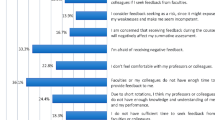Abstract
The feedback sandwich technique—make positive comments; provide critique; end with positive comments—is commonly recommended to feedback givers despite scant evidence of its efficacy. These two studies (N = 20; N = 350) of written peer feedback with third-year medical students on clinical patient note-writing assignments indicate that students think feedback sandwiches positively impact subsequent performance when there is no evidence that they do. The effort necessary to produce feedback sandwiches and students’ unwarranted confidence in their performance impact have implications for teaching about how to give feedback.
Similar content being viewed by others
References
Bienstock, J. L., Katz, N. T., Cox, S. M., Hueppchen, N., Erickson, S., & Puscheck, E. E. (2007). To the point: Medical education reviews—providing feedback. American Journal of Obstetrics and Gynecology, 196(6), 508–513.
Boehler, M. L., Rogers, D. A., Schwind, C. J., Mayforth, R., Quin, J., Williams, R. G., et al. (2006). An investigation of medical student reactions to feedback: A randomized controlled trial. Medical Education, 40, 746–749.
Chapman, O. L., & Fiore, M. A. (2001). The white paper: A description of CPR [Electronic Version]. Retrieved 10 April 2007, from http://cpr.molsci.ucla.edu/.
Dohrenwend, A. (2002). Serving up the feedback sandwich. Family Practice Management, 9, 43–46.
Dweck, C. S. (1999). Caution-praise can be dangerous. American Educator, 23(1), 4–9.
Gielen, S., Peeters, E., Dochy, F., Onghena, P., & Struyven, K. (2010). Improving the effectiveness of peer feedback for learning. Learning and Instruction, 20, 304–315.
Glover, P. A. (2000). ‘Feedback. I listened, reflected and utilized’: Third year nursing students’ perceptions and use of feedback in the clinical setting. International Journal of Nursing Practice, 6, 247–252.
Hattie, J., & Timperley, H. (2007). The power of feedback. Review of Educational Research, 77, 81–112.
Hesketh, E. A., & Laidlaw, J. M. (2002). Developing the teaching instinct: Feedback. Medical Teacher, 24(3), 245–248.
Kluger, A. N., & DeNisi, A. (1996). The effects of feedback interventions on performance: A historical review, a meta-analysis, and a preliminary feedback intervention theory. Psychological Bulletin, 119(2), 254–284.
LeBaron, S. W. M., & Jernick, J. (2000). Evaluation as a dynamic process. Family Medicine, 32(1), 13–14.
OzGrid.com (n.d.). Count words in a cell. Retrieved from http://www.ozgrid.com/Excel/count-words.htm.
Prins, F. J., Sluijsmans, D. M. A., & Kirschner, P. A. (2006). Feedback for general practitioners in training: Quality, styles, and preferences. Advances in Health Sciences Education, 11, 289–303.
Richardson, B. K. (2004). Feedback. Academic Emergency Medicine, 11(12), 1283.e1–1283.e5.
Rogers, D. A., Boehler, M. L., Schwind, C. J., Meier, A. H., Wall, J. C. H., & Brenner, M. J. (2012). Engaging medical students in the feedback process. American Journal of Surgery, 203(1), 21–25.
Schlecht, K. D. (2008). Feedback. International Anesthesiology Clinics, 46(4), 67–84.
Schwenk, T. L., & Whitman, N. (1987). The physician as teacher. Baltimore, MD: Williams & Wilkins.
Shute, V. J. (2008). Focus on formative feedback. Review of Educational Research, 78(1), 153–189.
Acknowledgments
This project was funded (in part) by a National Board of Medical Examiners® (NBME®) Edward J. Stemmler, MD Medical Education Research Fund grant. The project does not necessarily reflect NBME policy, and NBME support provides no official endorsement.
Conflict of interest
We are not aware of any conflicts of interest.
Ethics approval
This study received ethics approval from the University of New Mexico School of Medicine Human Research Review Committee.
Author information
Authors and Affiliations
Corresponding author
Rights and permissions
About this article
Cite this article
Parkes, J., Abercrombie, S. & McCarty, T. Feedback sandwiches affect perceptions but not performance. Adv in Health Sci Educ 18, 397–407 (2013). https://doi.org/10.1007/s10459-012-9377-9
Received:
Accepted:
Published:
Issue Date:
DOI: https://doi.org/10.1007/s10459-012-9377-9




